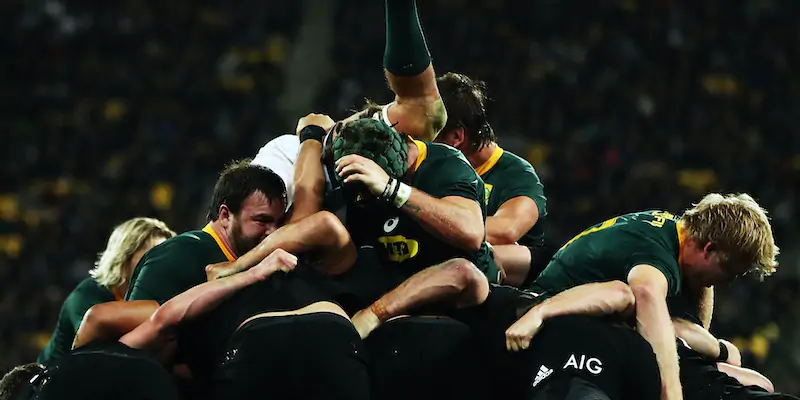
One Hundred Years of New Zealand vs. South Africa in Rugby
Football and Brazil. Basketball United States. In rugby, the two most emblematic national teams are New Zealand and South Africa, who will meet for the 100th time on Saturday morning in Townsville, Australia on the penultimate day of the Four Nations Championship – the Southern Hemisphere Championship – a hundred years after its first match. Meeting.
Their competition is one of the longest running and most competitive in the world of sports. They are two historically strong national rugby teams and are the two teams that have exported the most number of players abroad. They have each won three World Cups – more than anything else – and events have linked them to each other over the past century.
South Africa is the defending champion of the national team, but a few days ago New Zealand regained first place in the world rankings. The All Blacks are now close to winning the Four Nations Championship, a tournament in which Australia and Argentina also participate.
The two contenders will play Saturday morning and then again the following Saturday, always in a “bubble” set up in Australia for you to play matches safely. To win the tournament, South Africa needs an achievement: you must win with the highest score possible and not make New Zealand score a single point.
Although New Zealand are the favorites to win the tournament, these two matches are still among the most anticipated matches of the year. Because comparisons between South Africans and New Zealanders have always been very hot and have helped define the history of rugby since 1921.
When we talk about New Zealand and South Africa, the first thing that comes to mind is the 1995 World Cup Final, also narrated by the film Invictus. In that edition, the South African team, which unexpectedly became a symbol of the country after the end of apartheid, beat New Zealand in the final.
That match was also the final match of the tournament that made the world discover Jonah Lomo, who is still considered the most influential player in rugby history. From that tournament, with athletic performance I’ve never seen it beforePerhaps more than anyone else, Lomu has contributed to the popularity of rugby.
South Africa today is led by Siya Kolisi, the first black captain in the history of the Springboks (the nickname by which the team is known). But thirty years ago, things were completely different. In 1981, a tour of then-apartheid South Africa sparked the largest protests seen in New Zealand at the time. The locals – who in the past also had to deal with apartheid – wished not to play the games, in protest of the apartheid regime in South Africa. Furthermore, South Africa previously refused to host New Zealand teams made up of Māori players.
But the New Zealand Rugby Union believes it can be played after the government’s decision not to interfere with the sport. The reaction of the New Zealanders was determined, and the protesters were even able to interrupt the meetings. After the 1981 tour, the two countries did not meet for more than a decade, until apartheid ended.
The rivalry with South Africa also included the haka, the traditional Maori dance that New Zealanders perform before every match. In 2005, in a period of great competition, the All Blacks lost 22-16 in Cape Town in the then Three Nations Championship. A month later, in Dunedin, they decided to “warn” the South Africans that they intended to take revenge by performing for the first time. or oh banguIt is considered the “bad” alternative to dancing. They won 31-27 in an amazing match.
The two opponents recently met in the last World Cup groups, and New Zealand won. But the most important game played in recent years was on September 15, 2018 in Wellington. There is South Africa returning from the most negative period in its history, came back to win Against the All Blacks four years later, interrupting eleven months of undefeated and starting the cycle that led to their last World Cup win.
Today, the two national teams are taking very different directions. New Zealand, after losing the title of world champion, and despite a generational change, remains very associated with the national championships, where almost all teams come from. His style is the best example of rugby being played in the Southern Hemisphere: amazing, fast and brilliant.
South Africa, according to many, is an increasingly northern hemisphere team. So he prefers a physical game, with big and formidable players rather than agile and fast. This is because his movement is getting closer and closer to the European Union: for several years now there have been South African teams playing European championships, for example, almost half of 42 have been called up to participate in the European Four Nations.

“Proud explorer. Freelance social media expert. Problem solver. Gamer. Extreme travel aficionado.”
